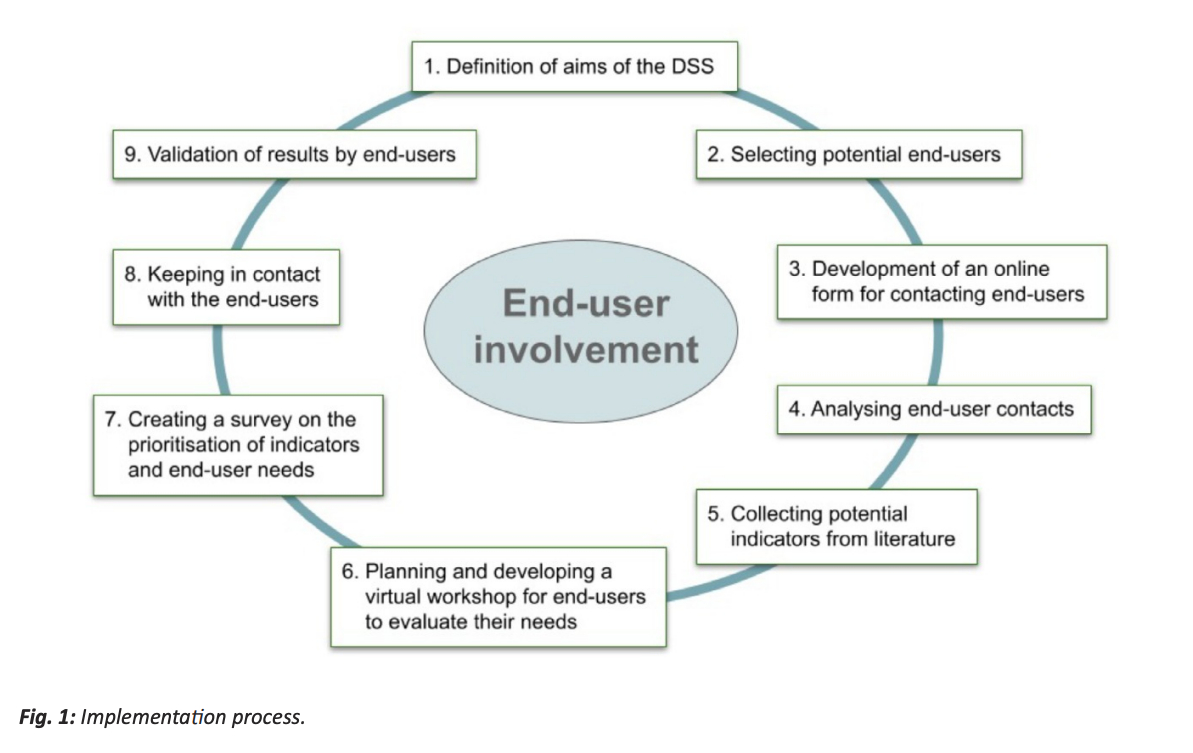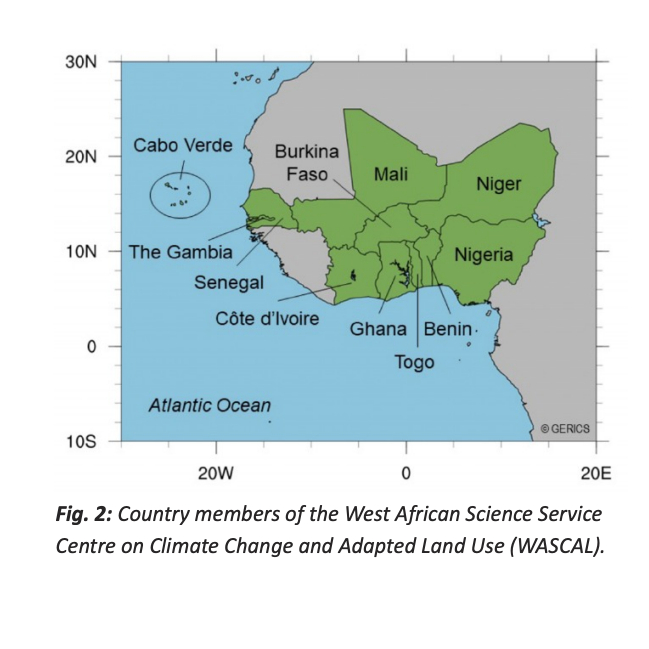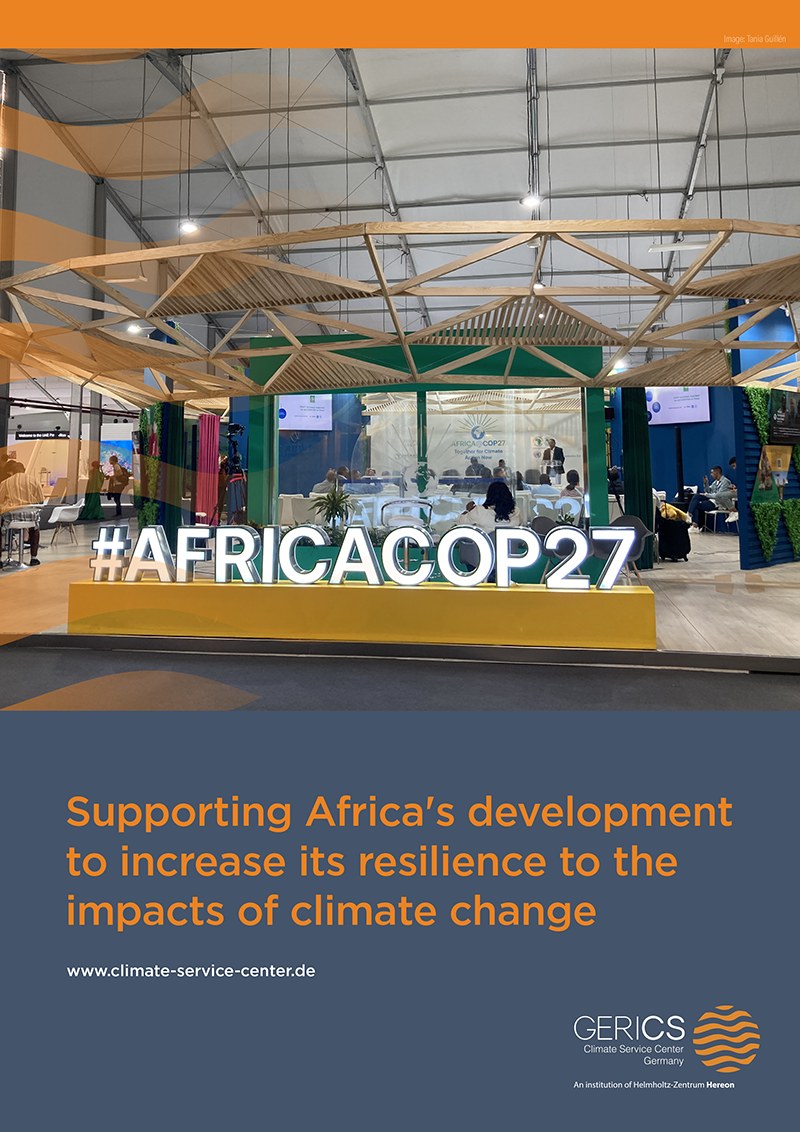Knowledge sharing on climate risks and codevelopment of climate services to cope with and recover from climate-related disruptions is a prerequisite for climate-resilient development
Climate change is affecting mankind worldwide with severely increasing economic, social and environmental losses and damages. As Jacob & Mysiak recently stated, Africa is among the most affected and least prepared regions of the world to cope with climate change and its disruptive effects and contributed least to its causes. Knowledge sharing on climate risks and codevelopment of climate services to cope with and recover from climate-related disruptions is a prerequisite for climate resilient development (Jacob & Mysiak, 2022).
Joint European and African initiatives can provide the platforms for highly needed climate actions and play a major role in the work at Climate Service Center Germany (GERICS) together with African partners. As outlined in this article, specific examples of ongoing joint research and knowledgesharing activities are classic joint research projects, such as the WASCAL WRAP 2.0: LANDSURF project, the SASSCAL 2.0: TIPPEC project, and CICLICO as shown below, also resulting in joint publications and special issues in journals like Climate Services.
The activities of GERICS also include continuous and proactive monitoring of all climate science and climate policy processes at the global level. This includes, first and foremost, the IPCC reporting cycles and the annual climate policy meetings in the UNFCCC framework of the Conference of the Parties (COPs).
Jacob & Mysiak, 2022 https://www.africaeuropefoundation.org/areas-of-action/fostering-africa-europe-knowledge-sharing-and-co-development-of-climate-services-on-adaptation/
The Science: Climate change in Africa – Africa remains at a critical juncture
The latest Intergovernmental Panel on Climate Change (IPCC)’ reports are crystal clear: we are in a critical moment when we can still avoid higher levels of global warming and, therefore, higher impacts and risks. Additionally, the reports confirm that the most vulnerable regions are already facing the adverse effects of climate change. Regardless of its little contribution to generating climate change, Africa is already experiencing the negative effects of this phenomenon, including widespread losses and damages. Agriculture and fishery are among the sectors most affected by climate change in Africa, especially in subSaharan and southern Africa.
Those negative impacts of climate change directly affect food security and livelihoods.
Climate related extremes, such as drought, heavy rains, and floods, are among the most common climatic drivers for migration and displacement. Additionally, climate change in Africa has increased regional inequality and poverty rates, among other negative effects. Climate services and climate literacy have been identified as key for adaptation processes. However, there is still limited climate related research on Africa (Pörtner et al., 2022, Trisos et al., 2022).
The “African COP” in Sharm elSheikh
In the global policy arena, the 27th Conference of the Parties (COP27) of the United Nations Framework Convention on Climate Change (UNFCCC), labelled as the “African COP,” took place in Sharm elSheikh, Egypt. Despite the limited progress on mitigation (reduction of greenhouse emissions), the COP27 finally delivered a strong message regarding the negative effect of climate change by establishing the Fund for Loss & Damage. The creation of the fund is the recognition that past and current lack of climate action is causing more losses and damages, especially in those vulnerable communities and regions.
The fund is a win for developing countries and vulnerable communities that have demanded financial resources to face the impacts of climate change since before the UNFCCC was created in 1992. It is a milestone in climate diplomacy/negotiations and a recognition of the lack of action in the last decades. African vulnerable communities and regions should benefit from the Loss and Damage Fund to face past and current losses and damages. Additionally, the African continent should be supported to play a key role in terms of climate solutions to halt the climate crisis.
References:
Portner, H. ̈ O., D.C. Roberts, H. Adams, I. Adelekan, C. Adler, R. Adrian, P. Aldunce, E. Ali, R. Ara Begum, B. BednarFriedl, R. Bezner Kerr, R. Biesbroek, J. Birkmann, K. Bowen, M.A. Caretta, J. Carnicer, E. Castellanos, T.S. Cheong, […], and Z. Zaiton Ibrahim, 2022: Technical Summary. [H.O. Portner, D.C. ̈ Roberts, E.S. Poloczanska, K. Mintenbeck, M. Tignor, A. Alegria, M. Craig, S. Langsdorf, S. Lo ́ schke, V. Moller, A. Okem ̈ (eds.)]. In: Climate Change 2022: Impacts, Adaptation and Vulnerability. Contribution of Working Group II to the Sixth Assessment Report of the Intergovernmental Panel on Climate Change [H.O. Portner, D.C. Roberts, M. Tignor, E.S. Poloczanska, K. Mintenbeck, A. Alegria, M. Craig, S. Langsdorf, ́ S. Loschke, V. Moller, A. Okem, B. Rama (eds.)]. Cambridge University Press, Cambridge, UK and New York, NY, USA, pp. 37118, doi:10.1017/9781009325844.002.
Trisos, C.H., I.O. Adelekan, E. Totin, A. Ayanlade, J. Efitre, A. Gemeda, K. Kalaba, C. Lennard, C. Masao, Y. Mgaya, G. Ngaruiya, D. Olago, N.P. Simpson, and S. Zakieldeen, 2022: Africa. In: Climate Change 2022: Impacts, Adaptation and Vulnerability. Contribution of Working Group II to the Sixth Assessment Report of the Intergovernmental Panel on Climate Change [H.O. Portner, D.C. Roberts, M. Tignor, E.S.Poloczanska, K. Mintenbeck, A. Alegria, M. Craig, S. Langsdorf, ́ S. Loschke, V. Moller, A. Okem, B. Rama (eds.)]. Cambridge ̈ University Press, Cambridge, UK and New York, NY, USA, pp. 12851455, doi:10.1017/9781009325844.011.
LANDSURF processes as a determinant of climate change in Africa – scenarios, high-resolution modelling and development of a stakeholder data portal
In West Africa, the Climate Service Center Germany (GERICS) is working with four African and two German partner institutions on the LANDSURF project to provide information on changes in land surface processes under current and future climate conditions for the region.
The Institute of Geography and Geology at the University of Würzburg coordinates the project work between GERICS, the Institute of Geosciences and Geography at the University of HalleWittenberg, the University of Ouagadougou in Burkina Faso, the United Nations University Institute for Natural Resources in Africa in Ghana, the Federal University of Technology Akure in Nigeria, and the AGRHYMET Regional Center in Niamey/Niger.

In the project, funded by the Federal Ministry of Education and Research (BMBF), a regional Earth system model for West Africa is being developed that will provide highresolution information on regional climate change. The model development follows a holistic approach, taking into account the dynamic interactions between atmosphere and land surface processes, including anthropogenic land cover change and land degradation, and between atmosphere and ocean.
Furthermore, to enable West African countries adapt to climate change, a webbased Decision Support System (DSS) mainly for agriculture but also for food security, water management and risk management is created in LANDSURF. The DSS is developed and codesigned with the endusers to ensure the user-friendly shape of the webportal. GERICS is guiding this process with its expertise throughout the project, e.g. by identifying specific climate indicators and needs with the endusers.
Moreover, GERICS, together with the project partners, analyses selected climate indices under different climate change scenarios and adapts EasyREMO for West Africa, which is a userfriendly version of the regional climate model REMO. Another important aspect of the project is the promotion of young scientists in the region. Therefore, topicspecific training workshops for young scientists are also offered during the project duration.

A first achievement of LANDSURF is an “Interaction protocol” between scientists and endusers that describes the codesign of a DSS developed with the partners in the project. The implementation of the protocol consists of nine different steps that have been successively gone through to identify specific climate indicators and needs for the DSS (Fig. 1). The protocol can be used as a template with slight modifications to facilitate the development of enduser oriented climate service products in future projects.
The West African Science Service Centre on Climate Change and Adapted Land Use (WASCAL) was established to address the challenge of climate change in Africa by strengthening the resilience of people and the environment to climate change and climate variability. The members of WASCAL are the West African countries Benin, Burkina Faso, Cabo Verde, Côte d’lvoire, The Gambia, Ghana, Mali, Niger, Nigeria, Senegal, Togo (Fig. 2). WASCAL is funded by the German Federal Ministry of Education and Research (BMBF).
Reference:
Weber, T., Gbode, I.E., Ziegler, K., Abel, D., Ajayi, V.O., Otte, I., Zoungrana, B.J.B., Coulibaly, A., Máñez Costa, M., Guillén Bolaños, T., Muwafu, S. and H. Paeth (2023). Users’ interaction protocol to identify specific climate indicators and enduser needs for the development of a decision support system (DSS). WASCAL WRAP 2.0: LANDSURF project.


